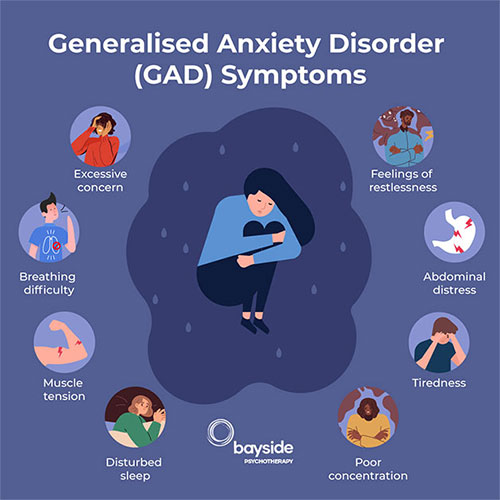One-on-one counselling for anxiety sessions that make a difference
Wiki Article
Checking Out Various Strategies in Coaching for Anxiousness Condition for Long Lasting Change
When taking on anxiousness conditions, it's vital to discover a range of counseling strategies. Each method offers unique insights and tools to help you manage your signs effectively. You might find that combining methods can yield the most effective outcomes. However, understanding the nuances of these techniques is key to cultivating long-term adjustment. What if the appropriate mix could launch a new level of psychological well-being for you?Understanding Anxiousness Disorders: A Quick Introduction
Anxiety problems, which affect numerous people worldwide, can considerably impact daily life. You could experience frustrating sensations of fear or fret that appear irrepressible. These sensations can lead to physical symptoms like a racing heart, sweating, or also lightheadedness. Usual sorts of stress and anxiety disorders include generalised stress and anxiety condition, panic problem, and social anxiousness disorder. Each has distinct signs, yet they all share a tendency to interrupt your regular and relationships.Understanding the source of your anxiousness is essential. It might originate from genetics, brain chemistry, or life experiences. Identifying your triggers can help you manage your feedbacks much better. It is essential to keep in mind that you're not alone in this battle. Lots of people encounter similar challenges, and looking for aid is a strong action toward sensation better. By finding out about stress and anxiety disorders, you're already on the course to understanding and managing your problem better.Cognitive-Behavioral Therapy: Testing Adverse Idea Patterns
In Cognitive-Behavioral Treatment, you'll begin by determining the adverse thought sets off that add to your stress and anxiety. When you identify these ideas, you'll service changing them with even more positive options. Together, you'll build efficient coping techniques to assist manage your anxiousness in day-to-day situations.Determining Negative Idea Triggers

Recognizing the details triggers behind your adverse thoughts can be essential in taking care of anxiousness when you experience moments of distress. Beginning by paying focus to circumstances that prompt sensations of fear or worry. Is it a crowded area, a future due date, or a conversation with specific people? Write down these instances in a journal. This will help you identify patterns in your reasoning. Notice physical sensations that accompany your adverse thoughts, like a racing heart or tightness in your chest. By pinpointing these triggers, you acquire insight into what's sustaining your anxiousness. Comprehending these connections is the primary step in testing those thoughts and inevitably regaining control over your psychological responses.
Replacing Ideas With Positives
Challenging negative idea patterns is a vital action in transforming your mindset and lowering anxiousness. You might typically find on your own trapped in cycles of insecurity or catastrophic reasoning. Instead of allowing these thoughts dictate your sensations, method changing them with favorable affirmations or realistic options. When you think, "I can't handle this," change it to, "I can take care of difficulties one action at a time." This straightforward adjustment can considerably influence your emotional state. Frequently identifying and responding to these unfavorable ideas aids produce a healthier interior dialogue. Keep in mind, it takes some time and initiative, however regularly exercising this method can result in long-term adjustment, encouraging you to encounter anxiousness with renewed self-confidence and durability.Building Coping Approaches Together
Replacing unfavorable ideas is only the start of handling anxiousness successfully. To create enduring change, you require to construct coping approaches that empower you. Cognitive-Behavioral Treatment (CBT) aids you determine and test those unhelpful thought patterns. With each other, you and your counselor can explore how these thoughts effect your feelings and behaviors.Start by creating useful strategies, like journaling or mindfulness exercises, that permit you to challenge stress and anxiety head-on. When you encounter your concerns progressively, you'll discover to respond in a different way.
Mindfulness and Acceptance-Based Approaches: Growing Present-Moment Awareness
As you navigate the intricacies of anxiousness, including mindfulness and acceptance-based techniques can substantially boost your capability to grow present-moment recognition. By concentrating on the present moment, you'll discover that you can observe your ideas and feelings without judgment (Counseling services for anxiety). This practice helps you recognize your stress and anxiety without feeling overwhelmed by it.Engaging in mindfulness workouts, such as deep breathing, body scans, or guided meditations, enables you to ground on your own in your current experience. Acceptance-based strategies encourage you to embrace your feelings instead of combat versus them. When you accept your feelings, they shed their power over you.Incorporating these practices right into your daily regimen can transform exactly how you react to anxiousness. You'll develop strength and find out to navigate difficult situations with better ease. Inevitably, growing present-moment recognition lays the structure for long lasting change, encouraging you to lead a much more fulfilling lifeExposure Therapy: Facing Worries Gradually
Exposure therapy assists you face your concerns in a steady way, making it much less overwhelming. You'll discover strategies to deal with anxiety-provoking situations action by step, while likewise constructing coping methods to manage your responses. This approach encourages you to take control and lower anxiousness with time.Progressive Exposure Methods

When facing stress and anxiety, gradually confronting your fears can be a powerful means to gain back control. This technique, understood as gradual direct exposure, includes slowly revealing yourself to the scenarios or things that activate your stress and anxiety. Start with much less intimidating situations and gradually function your method up to more challenging ones. If you're terrified of public speaking, you could start by speaking in front of a mirror, then progress to sharing thoughts with a close friend, and eventually address a tiny team. Each step aids desensitize you to the anxiety, building your confidence in time. Bear in mind, it's necessary to pace on your own and celebrate small triumphes as you relocate with this process, reinforcing your capability to manage anxiety efficiently.
Structure Coping Techniques
Structure reliable coping approaches is essential for taking care of anxiety, particularly as you face your anxieties gradually - Counseling services for anxiety. One effective technique is exposure therapy, where you start by encountering your fears in a controlled manner. Start with less daunting circumstances and slowly work your way as much as even more difficult scenarios. This progressive exposure aids desensitize you to stress and anxiety triggers, making them much less overwhelming.Incorporate relaxation techniques, such as deep breathing or mindfulness, to soothe your mind throughout direct exposure. Track your progression, celebrating little victories in the process to increase your confidence. Remember, it's alright to take your time; the objective isn't excellence yet consistent renovation. By building these techniques, you'll encourage yourself to navigate anxiety and welcome life a lot more fullyPsychodynamic Therapy: Uncovering Origin of Anxiousness
Psychodynamic therapy explores the unconscious mind, revealing the source of your anxiety. By examining your thoughts, sensations, and previous experiences, this approach aids you reveal underlying disputes and unsettled issues that might add to your present anxiety. You'll work with a specialist to explore childhood experiences, partnerships, and psychological patterns that form your feedbacks today.As you get understanding right into these deeper layers of your mind, you'll start to acknowledge just how previous events influence your existing habits. This understanding can lead to catharsis, enabling you to refine feelings you could have suppressed.Through the therapeutic relationship, you can likewise recognize defense reaction that may have created gradually, using a clearer path to change. Eventually, psychodynamic treatment outfits you with the devices to address your stress and anxiety at its core, advertising long lasting makeover in your psychological wellness.Integrative and Alternative Techniques: Integrating Techniques for Greater Efficiency
Integrating numerous therapeutic strategies can improve your trip toward taking care of anxiety better. By combining elements from cognitive-behavioral treatment, mindfulness methods, and alternative approaches, you can create an individualized strategy that resolves your special demands. For instance, you might utilize cognitive-behavioral strategies to challenge negative thought patterns while incorporating mindfulness exercises to ground yourself in today moment.Additionally, checking out holistic methods such as yoga or reflection can promote relaxation and minimize anxiousness signs and symptoms. This mix permits you to develop greater self-awareness and resilience.Experimenting with these diverse approaches can assist you find what reverberates most with you. Bear in mind, it's about discovering a synergy that works, instead than staying with a solitary technique. This integrative technique not just provides immediate alleviation however also cultivates long-term skills for handling anxiety, equipping you to recover control over your life.The Function of Support Equipments: Building Strength Via Link
While it could appear that handling stress and anxiety is a singular journey, having a solid support group can play an essential function in your durability. Bordering on your own with compassionate friends, family, or assistance groups creates a secure area where you can openly share your feelings and experiences. When you connect with others, you advise on your own that you're not alone in this struggle.These connections supply motivation and can supply sensible coping approaches that have actually helped others. It's also a possibility to obtain point of view; good friends can assist you see scenarios differently, minimizing sensations of isolation.Moreover, psychological support fosters a sense of belonging, which can considerably reduce anxiety symptoms. By leaning on your support system, you can construct resilience and take on challenges extra successfully. Bear in mind, connecting for help is an indicator of strength, and it can make all the distinction in your journey toward taking care of stress and anxiety.Often Asked Concerns
What Are the Common Symptoms of Anxiety Disorders?
You might experience restlessness, exhaustion, trouble focusing, irritation, muscle tension, and rest disruptions. Physical symptoms can consist of rapid heart beat, sweating, and trembling. Recognizing these indicators early can aid you seek appropriate assistance and treatment.How Much Time Does Therapy Normally Last for Anxiety Problems?
Treatment for anxiousness problems generally lasts anywhere from a few weeks to a number of months. It truly relies on your private needs, development, and the strategies your therapist makes use of to assist you manage your stress and anxiety properly.Can Drug Be Utilized Along With Therapy for Stress and anxiety?
Yes, drug can definitely be used alongside therapy for anxiousness. Combining both techniques frequently boosts therapy effectiveness, helping you manage signs while exploring underlying issues with therapy (Counseling services for anxiety). read more Always consult your doctor for individualized suggestionsAre There Self-Help Approaches for Taking Care Of Stress And Anxiety?
Yes, there are several self-help techniques for taking care of anxiousness. You can exercise mindfulness, participate in routine workout, maintain a balanced diet regimen, establish a regular, and use deep breathing methods to help lower anxiety signs and symptoms properly.How Do I Know if I Required Expert Assistance for Stress And Anxiety?

Report this wiki page